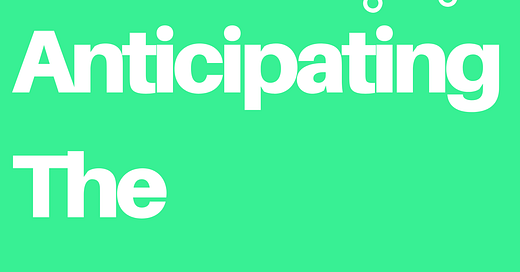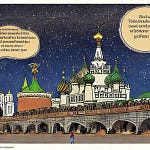This newsletter is really a public policy thought-letter. While excellent newsletters on specific themes within public policy already exist, this thought-letter is about frameworks, mental models, and key ideas that will hopefully help you think about any public policy problem in imaginative ways. It seeks to answer just one question: how do I think about a particular public policy problem/solution?
PS: If you enjoy listening instead of reading, we have this edition available as an audio narration on all podcasting platforms courtesy the good folks at Ad-Auris. If you have any feedback, please send it to us.
- RSJ
The West German band Scorpions released their anthemic number Wind of Change sometime in early 1991. It is hard to find a better popular culture artefact that captures the mood in Europe during those times. The Berlin Wall had come down, democratic revolutions were sweeping across the countries of eastern Europe and it was clear the liberal democratic order running their economies on the ‘Washington consensus’ had won the Cold War.
The lyrics had both that triumph and a hope for future contained within:
“The world is closing in
Did you ever think
That we could be so close, like brothers
The future’s in the air
Can feel it everywhere
Blowing with the wind of change..
The wind of change
Blows straight into the face of time
Like a storm wind that will ring the freedom bell
For peace of mind”
To broaden things a bit beyond Europe, the 90s were also the time when China was entering the global economy and India was ‘reforming’. Things seemed to be all converging towards the same end. The ‘end of history’ as Fukuyama put it was nigh. Liberal democracy was the ultimate political system. Nothing could better it. We just needed to wait for every nation-state to realise this truth.
Not Quite The Expected Future
Exactly 30 years later, the obvious question is staring at our face. There’s the rise of populist, xenophobic and authoritarian leaders all across eastern and central Europe over the last decade. Russia is a kleptocratic oligarchy that bullies it neighbours who don’t toe its line. On various counts, India has regressed on liberal values and has slowed considerably on reforms. China, contrary to expectations, didn’t become more liberal or democratic as it integrated itself with the world. Instead, it now mocks the liberal western order for its weakness while exporting its brand of illiberal governance as it continues it inevitable rise to the top. Leave these aside for a moment. What’s worse, even the western democracies that were flagbearers of liberalism are caught in the pincer-like grip of populist political urges on both the right and the left.
So, what happened?
How did the spirit of liberalism that pervaded the world in the 90s dissipate so easily? Well, there’s a whole small-scale industry that’s developed over the years to answer this question. And I must add I’m a platinum-card carrying customer of this industry. Over the last year or so I have been reading up every book that elaborates either on the failure of the market economy or the shortcomings of liberalism.
The Light That Failed
A recent entrant to this list is the magnificent ‘The Light That Failed: Why The West Is Losing The Fight For Democracy’ by Ivan Krastev and Stephen Holmes. Krastev, a Bulgarian by birth, serves at the Institute for Human Science in Vienna while Holmes teaches at NYU School of Law. They bring a wide east-west perspective to their arguments on why liberalism failed. Among the books I have read in this genre (including Fukuyama’s Political Order And Political Decay), this is the most analytical in understanding the underlying psychosis of illiberal, populist movements sweeping the world.
At the start of the book, the authors talk about John Feffer, a young American, who in 1990 spends most of the year traversing across post-Communist Europe with an intent to record the transition of these countries into free, open and liberal societies. There’s something Naipaul-ian about this. Naipaul wrote Among The Believers based on his travels across non-Arabic Muslim world with a long pre-Islamic history (Iran, Pakistan, Malaysia and Indonesia) immediately after the Iranian Revolution. Naipaul wandered around without a definite plan, talked to a cross-section of people and ended up with deep insights about these societies. In a similar vein, Feffer spends most of his time speaking to local people to document their hopes and apprehensions in times of tumultuous change in their lives. And quite like Naipaul went back to the same countries two decades later and wrote Beyond Belief, Feffer goes back in 2015 to speak to the same people on how their lives have panned out in the intervening period. What he found was a warped kind of capitalism had taken root that had accentuated inequalities in the society. There was widespread resentment of western values that were transplanted there and a feeling of betrayal about the failed promise of 1990s. Feffer concludes: Communism was the god that failed for the post WW2 generation in eastern Europe. For the current generation, liberalism is the god that failed.
While Krastev and Holmes explain the reasons for the failing in eastern Europe in great detail, there are broader conclusions one can draw that could be used to explain the widespread disappointment about liberalism across the world. I drew three of them.
Cheap Imitation: Liberal democracy adapted by these countries are a cheap imitation of the western model. There was limited attempt at locating it in the history and the culture of these nations. The national traditions were given a go by and there was no desire to transform the society from within to manage this transition. Foreign experts who barely understood the ground realities were flown in to set up democratic institutions. There was festering discontent among people who found the struggle to become a cheap imitation of a western democracy humiliating. The nativist backlash shouldn’t have surprised anyone. A spark was waiting to be lit. The populist leaders waded in. They questioned the superiority of this model, delegitimised the moral authority of political parties that followed the western liberal mores unquestioningly and spoke about a glorious past which should be the guiding light for the society. It worked. This is pretty much the playbook for all populist leaders around the world. Some of this has been followed in India too. The only thing remarkable about us is the backlash came some 70 years after independence. There was an undercurrent of resentment about western imitation in our society driven by a liberal constitution that seemed to have been thrust upon us. A combination of factors – heterogeneity in our society, charismatic leaders who were steeped in western ideals and an urban, educated elite who held the levers of power and media for long – seemed to have kept this resentment at bay for long. But this edifice is crumbling. Or maybe, it has already crumbled.
Triumphalism of Liberals: The hard-won benefits of cold war were frittered away by a remarkable dropping of the guard by the liberals over the last two decades. As the authors write: “Liberalism fell in love with itself and lost its way”. The years of heady growth till 2008 where an interplay of forces of globalisation, technology advances and cheap credit kept the growth engine humming and led everyone to believe a rising tide was lifting all. The Global Financial Crisis (GFC, 2008) was a rude jolt. The faultlines of economic inequality, unaccountable financial institutions, a self-serving set of elites and a corrupt political class became stark and visible. The reckoning that was expected after the GFC never came. Instead the solutions to the GFC led most to believe the real culprits not only got away but also profited from it. The belief that losses are socialised while the gains are cornered by a few strengthened. GFC still casts a long shadow on the polity across the world. We have reached a stage where both the extreme right and left rile against liberalism to work up their base following the GFC.
Demographic Anxieties: As the growth became more lopsided and inequality grew, the demographic anxieties strengthened. These anxieties take various shape in different democracies, but they have one similar feature – a sustained othering of the minority. The irrational fear that the more fecund minorities will gradually engineer a democratic and cultural ‘coup’ by turning themselves into a demographic majority and take over political and social power has gained strong currency. This takes shape differently across countries. In eastern Europe there is a steady degrowth of the native ethnic groups over the last 2 decades where the educated, liberal elites have voted with their feet and left their homes. In US and UK, income inequality, social fallout of globalisation and an ageing population has fed the paranoia about minorities. The story in India, of late, is well known to be repeated here. The common outcome of all of this is a lurch towards ethno-nationalism with a ‘nation-first’ doctrine. It is a far cry from the boundaryless global village that liberals thought they had achieved sometime back.
In the list of books I have read over the past 18 months, The Light That Failed scores over others in its rigorous analytical dissection of the reason for failure of liberalism. It is short on rhetoric. And unusually for the genre, it believes a diversity of ideologies is good while simultaneously holding out hope that liberalism will learn its lessons. That it will not again strive for homogeneity and ideological dominance around the world.
The authors end the book with a tip to Rudyard Kipling’s first book (from where the title is drawn) The Light That Failed. That novel had two different endings – one happy and one sad. The authors hope that a “chastised liberalism having recovered from its unrealistic and self-defeating aspirations to global hegemony, remains the political idea most at home in the 21st century. It is our choice to celebrate rather than moan.” That’s their expectation of a happy closure.
HomeWork
Reading and listening recommendations on public policy matters
[Video] Krastev and Holmes discuss the book at CEU (Vienna)











Share this post